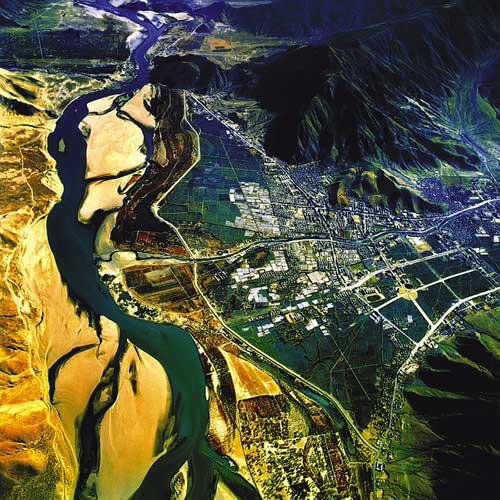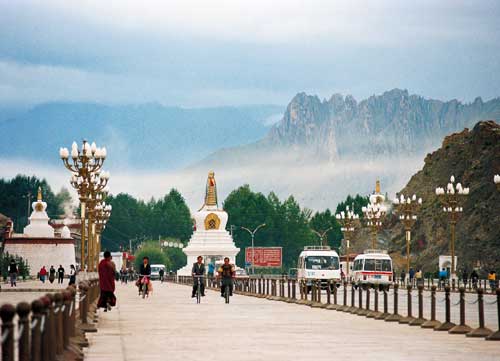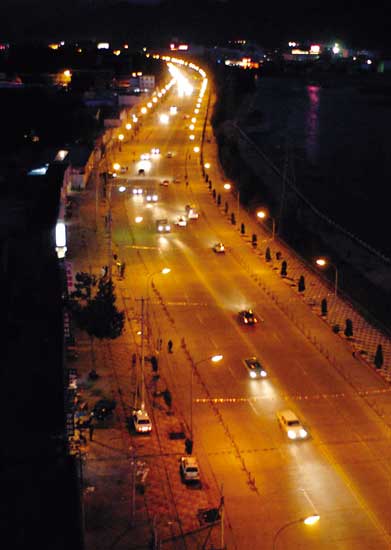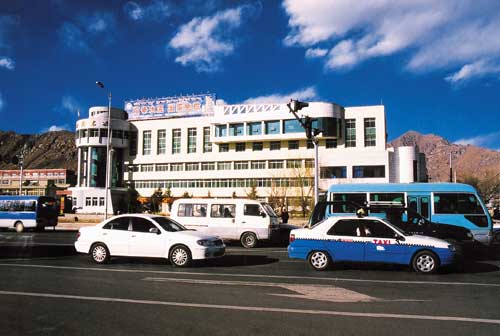| Homepage |
| New books |
| News in Brief |
| list of late magazines |
| Articles Recommended |
Transportation in Lhasa City Turns to a New Page
Text by Sonam Tsering

Overview of Lhasa Municipality with its advanced transportation network.Photo by Tian Jieyan
Road construction in Lhasa City has turned a new page over recent decades due to disinterested support from provincial and municipal governments in the hinterland, in particular under the auspices of the government of Beijing Municipality and Jiangsu Province. Unbelievable changes of the roads in Lhasa City not only improve the city's transportation infrastructure, but bring about direct benefits to local residents as well.
Nyiwang, a taxi driver, said: "In recent years, the roads in Lhasa have changed dramatically. While building the Jiangsu Road, I was actually on the scene. I saw the cement was very deep and the steel reinforcing was very thick. The roads were designed to be wide. Many people said that they had never seen roads built like that. And the cost! Of course, the road is perfect and people referred to the 'first road on the roof of the world '. Driving on such nice roads will not damage vehicles but will make driving very comfortable. In the past, we did not notice any difference, but since the new road opened to traffic, we found familiar buildings beside the roads looked so small, and did not match with the new roads any more. I don't use big words, but rather my true feeling".
Tsering Ngodrup, a private taxi driver, said:"In Lhasa, the vehicle availability is one vehicle to 17 persons, which enabled Lhasa City to become, on average, the city with the largest ratio of public vehicles in China. Nevertheless, Lhasa is not a big city, but rather one with a weak infrastructure and large debts from city construction. With such a status quo, the transport situation is really favorable; we are so pleased that traffic jams are still far away from us. "

Brijing Middle Road.
Guire, a resident from the ancient downtown, said: "I'm already old and cannot do anything; I prefer to take a prayer walk every morning and night by passing through Beijing Road and Jiangsu Road. Though these two roads were not constructed by us, I experienced new scenery, contentment and convenience which were brought about from our brotherhood..."
After the Tibet National Works Conference, in accordance with the data from the project acceptance office of the Lhasa Government and since the decision that the Beijing and Jiangsu Province should directly provide support to Lhasa Municipality, the governments of Beijing and Jiangsu have attached great importance to it. Both governments insist upon the principle of "focusing on construction of infrastructure, stressing projects which benefit the public and closely associate with production and the lives of civilians, and mainly work within the City's planning projects". They highlighted key and rational projects and tried to choose the best. By integrating both disinterested support and onerous projects (but emphasizing the disinterested ones) both governments have taken the approach of adding up the advantages and bringing benefits to all.
The two governments attach great importance to the construction of infrastructure related to education, culture, and also downtown construction through the implementation of a large number of disinterested projects. Up to the end of 2004, the total investment in terms of capital and materials reached 816,600,600 Yuan (Beijing: 303,959,600 Yuan; Jiangsu: 512,641,000Yuan). Road construction in the downtown area mainly includes the construction of the Middle Beijing Road that runs from the Potala Palace Square to Yak Brass Statue (which the Beijing government supported with 2,540,000 Yuan), Barkor Road of Lhasa (Beijing government: 6,150,000 Yuan), Jiangsu Road (Jiangsu government: 40,000,000 Yuan), and the East Beijing Road (Beijing government, 27,000,000 Yuan).

East Jiangsu Road at night.
Accompanying the implementation of group construction projects, the status quo of infrastructure in Lhasa city and also some supported counties and districts have changed remarkably. In particular the city functions and facilities are more comprehensively equipped, and the previous declined reversed. The staff of Lhasa's transport system believe that road construction in previous years was weak on long-range planning, had less planning for sustainability, ambiguous objects, and lacked standardization. Therefore, the Lhasa Bureau of Transport had discussions with the Jiangsu Province Bureau of Transport, and reached consensus to integrate the construction plans for a road network in Lhasa into the support program in 2000. By the end of 2000, they had completed construction plans for the Lhasa City road network for 2001 to 2002. Since then, Lhasa has had its own blueprint for road construction that in fact matched the standards of advanced provinces in the hinterland.
During the tenth five-year plan, the Lhasa Bureau of Transport of has implemented 50 projects for road construction with a total investment of 650 million Yuan. Most of those projects were gradually finished between 2003 and 2005.
In consideration of their tremendous task in road construction, the Lhasa Bureau of Transport took the initiative in seeking support from the Jiangsu Bureau of Transport to adopt advanced managerial models and technological indicators during its preparation, project bid, management, and evaluation process. On the other hand, due to the characteristics of Lhasa City, the Lhasa Bureau of Transport approached their task creatively?? dividing Lhasa into several parts to be separately managed. In addition, several managerial systems, such as legal management, quality management and implantation units were fully implemented.

A shot of the Dangra Road. By the author
Since the third National Conference for Tibetan Works, the Jiangsu Province Bureau of Transport donated 27 projects, with a total investment of 31,980,000 Yuan to Lhasa. Without exaggeration, the glorious achievements accomplished in the transportation system of Lhasa could be attributed to the support received from the transport system of Jiangsu.
For the convenience of the residents in the districts of Karmagusang, Ngojethang, and Tongre, The first part of Jiangsu Road, supported by the government of Jiangsu Province, was begun in September of 2006. According to Mr. Yang, the safety supervisor from Tibet Yong Feng Construction Co. Ltd. decided that the Jiangsu Road would be built with two parallel vehicle lanes for a total of 4.987 kilometres in length. The main part of the road is 2.351 meters wide and 38 meters long; and the No. 1 east Road and No.1 west Road are on average 1.318 metres long and with 30 metres wide. On 2nd of April, the author observed that the workers were working on the drainage system, and preparing to cover it up again. The project was challenged because enormous cables were buried underground.
At the end of May, a new "Donated Road"emerged from the ancient City of Lhasa.